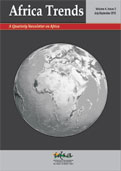India’s New Initiative in Africa: The Asia–Africa Growth Corridor
The Corridor marries India’s brand of human resources development and capacity building with Japan’s objective of delivering quality infrastructure in the region.
- Ruchita Beri |
- June 13, 2017 |










